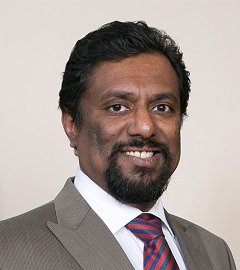Speaker: Saman Amarasinghe (MIT)
Abstract:
When I was a graduate student a long time ago, I used to have intense conversations and learned a lot from my peers in other areas of computer science as the program structure, systems, and algorithms used in my compiler were very similar to and inspired by many of the work done by my peers. For example, a Natural Language Recognition System that was developed by my peers, with a single sequential program with multiple passes connected through IRs that systematically transformed an audio stream into text, was structurally similar to the SUIF compiler I was developing. In the intervening 30 years, the information revolution brought us unprecedented advances in algorithms (e.g., machine learning and solvers), systems (e.g., multicores and cloud computing), and program structure (e.g., serverless and low-code frameworks). Thus, a modern NLP system such as Apple’s Siri or Amazon’s Alexa, a thin client on an edge device interfacing to a massively-parallel, cloud-based, centrally-trained Deep Neural Network, has little resemblance to its predecessors. However, the SUIF compiler is still eerily similar to a state-of-the-art modern compiler such as LLVM or MLIR. What happened with compiler construction technology? At worst, as a community, we have been Luddites to the information revolution even though our technology has been critical to it. At best, we have been unable to transfer our research innovations (e.g., polyhedral method or program synthesis) into production compilers. In this talk I hope to inspire the compiler community to radically rethink how to build next generation compilers by giving a few possible examples of using 21st century program structures, algorithms and systems in constructing a compiler.
Bio:
Saman Amarasinghe is a Professor in the Department of Electrical Engineering and Computer Science at Massachusetts Institute of Technology and a member of its Computer Science and Artificial Intelligence Laboratory (CSAIL) where he leads the Commit compiler group. Under Saman’s guidance, the Commit group developed the StreamIt, PetaBricks, Halide, Simit, MILK, Cimple, TACO, GraphIt, BioStream, CoLa and Seq programming languages and compilers, DynamoRIO, Helium, Tiramisu, Codon, StreamJIT and BuildIt compiler/runtime frameworks, Superword Level Parallelism (SLP), goSLP, VeGen and SuperVectorizer for vectorization, Ithemal machine learning based performance predictor, Program Shepherding to protect programs against external attacks, the OpenTuner extendable autotuner, and the Kendo deterministic execution system. He was the co-leader of the Raw architecture project. Saman was a co-founder of Determina, Lanka Internet Services, Venti Technologies, and DataCebo Corporations. Saman received his BS in Electrical Engineering and Computer Science from Cornell University in 1988, and his MSEE and Ph.D. from Stanford University in 1990 and 1997, respectively. He is an ACM Fellow.
Prof. Saman Amarasinghe leads the Commit compiler research group in MIT’s Computer Science & Artificial Intelligence Laboratory (CSAIL), which focuses on programming languages and compilers that maximize application performance on modern computing platforms. He is a world leader in the field of high-performance domain-specific languages. Prof. Amarasinghe’s group developed the Halide, TACO, Simit, StreamIt, StreamJIT, PetaBricks, MILK, Cimple, and GraphIt domain-specific languages and compilers, all of which combine language design and sophisticated compilation techniques to deliver unprecedented performance for targeted application domains such as image processing, stream computations, and graph analytics. Dr. Amarasinghe also pioneered the application of machine learning for compiler optimizations, from Meta optimization in 2003 to OpenTuner extendable autotuner today. With professor Anant Agarwal, he co-led the Raw architecture project, which did pioneering work on scalable multicores. Prof. Amarasinghe’s entrepreneurship activities include founding Determina, Inc. (acquired by VMWare) based on computer security research pioneered in his research group at MIT and co-founding Lanka Internet Services, Ltd., the first Internet Service Provider in Sri Lanka. Prof. Amarasinghe is also the faculty director of MIT Global Startup Labs, whose summer programs in 17 countries have helped to create more than 20 thriving startups. Prof. Amarasinghe developed the popular Performance Engineering of Software Systems (6.172) class with Professor Charles Leiserson. He also created individualized software project classes such as the Open Source Software Project Lab, the Open Source Entrepreneurship Lab, and the Bring Your Own Software Project Lab.
Tue 5 AprDisplayed time zone: Eastern Time (US & Canada) change
09:00 - 10:00 | Keynote - CGOKeynotes | ||
09:00 60mKeynote | Compiler 2.0 Keynotes Saman Amarasinghe Massachusetts Institute of Technology | ||
